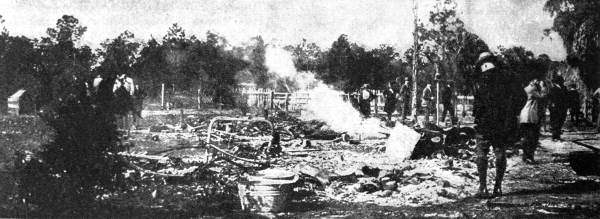
They came again the next day, Sunday, fueled with the fire of alcohol in their guts and gasoline on the grass, and they burned the rest of the town to the ground. One picture survives that shows the carcasses of cats smoldering and the broken iron rungs of someone’s bed lying in the ashes on the smoking ground. One last picture of the town, and you must wonder: who would take a photograph of such a horror?
A small group of editors of newspapers condemn the actions of the mob, a small group of citizens demand justice, and so the governor is pressured and at his command a court is assembled. It meets, quickly adjourns, the verdict, “At the hands of persons unknown” and Rosewood is gone and forgotten and no longer exists in time.
The land is sold for taxes within a few years and soon not even the iron bedstead remains, only the graves of the dead. In time the headstones are grown over and fall over, and the depot, slowly covered and pulled down by vines, is the last sign that once, here, was a town.
The smoke from the fires drifted away and left a layer of cold ash over the land where once there was joyous song and laughter from innocent voices, innocent no more. Nearby the town of Sumner fades, never realizing its dark twin city was its necessary sister. Once Rosewood is gone Sumner soon follows, the mill stands idle for lack of workers and is burned down for insurance money after the machinery was moved south to Lacoochie and reassembled by survivors. For three years the people near to this awful haunt worked and lived and forgot. Then, in 1926, Nature scoured them off the Earth during a hurricane that flooded twelve miles in from the coast, destroying their homes and livelihoods, reshaping the edge of the Gulf Hammock into a hundred small islands and more swampland, this new swamp missing the old pine trees and cedar giants that gave this place a name. Few trees of any type survived and soon most of the people left the destruction and the land never truly recovered. It became a place of low scrub and thin sand, salted by the ocean and erased by the wind for fifty years. Finally only a thin band of buildings clung to the coast, a place to harvest bivalves and to fish and to drink, quiet and forgotten. Rosewood was no more, just pine flats and palm hammocks and the graves of the forgotten marking where it once stood.
There are no creatures here. No predators are left, for there is no prey. The rosewood cedar is finished, the pine trees are cut for paper now, and time has forgotten this place.